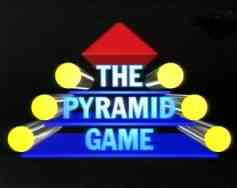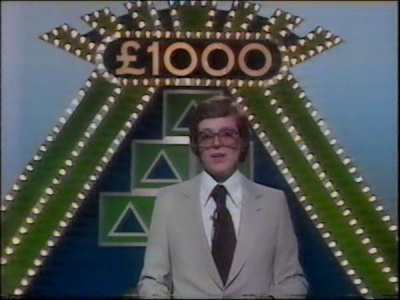The Pyramid Game

Contents |
Host
Steve Jones (1981-90)
Donny Osmond (2007)
Co-hosts
Voiceover: Robin Houston (1978-84)
Broadcast
As part of Bruce Forsyth's Big Night: 1978
As part of The Steve Jones Games Show: 1979
As standalone programme:
LWT in association with Bob Stewart Productions and Philip Hindin for ITV, 5 September 1981 to 18 August 1984 (46 episodes in 3 series)
TVS in association with Chapter One and Talbot Television for ITV, 9 January 1989 to 6 April 1990 (80 episodes in 2 series)
Sony for Challenge, 7 May to 15 June 2007 (30 episodes in 1 series)
Synopsis
Steve Jones, when not being a voice-over to every Awards ceremony ever, occasionally could be found in his spare time hosting this. Two celebrities, of the A-and-a-half list variety, would attempt to match minds with two contestants. But not before the distinctly average synthesiser theme tune.
Taking pride of place in the middle of the studio would be a bank of six screens structured in a pyramid shape. On each one would be a title. These would usually be cryptic clues to the topic of conversation but failing that, they'd just be poor puns.
In the first round, the celebrity would first pick a title which would then reveal the subject. The celebrity would then have to describe, as best as they can, to the contestant seven words connected by the subject within thirty seconds. They could use as many gestures and words as they liked but they couldn't mention anything that sounded vaguely like the word being guessed. If they did they would get a humiliating "honk" noise from the judges and they would have to move on. A little bit like Password, in fact. They scored one point for every correct answer. The other team then did the same thing. Afterwards, this would be repeated but with contestant describing to celebrities and back again in round three.
Whoever had scored the most points after round three would go through to the Winners' Circle. Here, the celebrity would have sixty seconds to convey six subjects, this time by way of lists. For example, if the subject was "Chemical Elements" they could say "Hydrogen, Oxygen" etc... until the contestant got it, they passed or an inappropriate clue was given (cue the aforementioned "honk" if the latter occurred). Of course, the subjects were usually sillier than "Things Not to do with a Kettle", which usually appeared in earlier rounds. The first three were worth a whopping £25 each, the next two £50 and the final one a bank-breaking £100. If they won the Winners' Circle both times, the cash would be augmented to £1,000. One notable point here is that miming was not allowed during this round within either version of the show - in fact, in the Osmond version, the celebrity had to put his/her arms into the straps provided in order not to do so. A celebrity guest on one of the Jones-era shows, the late Claire Rayner, did the next best thing by sitting on her hands during that round - when Jones amusedly picked up on that, Rayner stated firmly, "I don't trust them".
The whole process was repeated after the break with contestants swapping celebs so as to give a fair crack of the whip to each contestant. The player who had won the most money that day had the dubious pleasure of doing it all again the next day. Celebrities stayed for each of the five weekdays.
In 2007 Challenge TV decided to make their own version with heart-throb to women of a certain age Donny Osmond, who had recently hosted the show in the US, at the helm. The set is more chrome-y than before but the game is pretty much unchanged - although we wish Osmond wouldn't keep referring to inappropriate clues as 'illegal clues'. Maybe that's a standard quiz show phrase in his native USA, but it seems like a harsh way of putting it here in the UK, and certainly an annoying one. The alternative phrase 'invalid clues' would be far more appropriate. The money is a bit bigger, though - the categories in the Winners' Circle now being worth £50, £75, £100, £125, £150 and £250, augmented to £1,000 if they get all six. What's more if they do it again in the same show they win an additional £2,000, and provided you get to the Winners' Circle twice in the same show you qualify to come back for the next one and add to the winnings. Another positive change is that Osmond stands behind a suitably-placed podium throughout - Jones always seemed to be switching between two podiums (or should we say podia?) in order not to block the contestants' view of the board, and this presumably meant that two sets of the same cards had to be printed, which would have been rather a waste of time and paper.
Overall, a decent and durable show, with two competent and affable hosts; not without its faults, but always good-natured and usually conjuring up a good few laughs through the inevitable weird and wonderful misunderstandings between the contestants and the celebs. It definitely passed the time quite happily for many.
Key moments
Behind one of the subjects each day was a 'Lucky 7' symbol (this changed to 'Secret 7' during the Osmond-era), which had its own distinctly average sound motif. If they could get all seven correct within the time they'd win the "lovely" Pyramid Clock - or, in later series, a random prize, such as a TV or a weekend break.
The outtake featured in 'It'll Be Alright On the Night', in which Suzi Quatro, who has been asked to describe words associated with the word 'roll', gets the word 'drum' and says, "Oh, it's a er... - a drum", followed by the inevitable 'honk', and, in her frustration, Quatro utters a swear word, which has been bleeped out.
Catchphrases
(Both hosts): "...And you've found the Lucky (or Secret) Seven...!"
(Donny Osmond): "Give me 30 seconds on the clock".
"Ready - go!"
"...You gave an illegal clue..." (yes, that's the annoying phrase).
"Will you please join me at the Winners' Circle?"
(At the end of the show): "...Let's bring everybody out into the Winners' Circle..."
Inventor
Based on the American version, originally entitled The $10,000 Pyramid, created by Bob Stewart.
Web links
See also
This started out as one segment of Bruce Forsyth's big blunder, Bruce Forsyth's Big Night, then became part of The Steve Jones Games Show.


